Landing a business intelligence internship can feel overwhelming, but you have the power to make it easier. Focus on learning the right skills and get comfortable with BI tools like FineBI. Build your confidence by practicing interview questions and refining your resume. Take time to understand what employers expect. Use every resource you find and let your strengths shine through your application.
If you want to stand out for a business intelligence internship, you need to know what employers look for. Companies want more than just technical know-how. They want candidates who can solve problems, communicate well, and think strategically. Let’s break down the key areas that will help you shine.
You might wonder which skills matter most for a business intelligence internship. Employers value a mix of technical and soft skills. Here are the top five skills that show up in recent surveys:
Soft skills matter just as much as technical ones. You need to inspire others, handle conflicts, and adapt to change. When you combine technical skills with strong communication and teamwork, you move ideas from concept to reality faster. This mix also helps you deliver a better experience to customers and colleagues.
Your academic background plays a big role in landing a business intelligence internship. Employers often look for students from these majors:
If you study one of these subjects, you already have a head start. Many companies also want to see that you have taken certain courses before you apply. Here’s a quick look at some common prerequisites:
| Major | Course Code | Course Name | Prerequisites |
|---|---|---|---|
| Management Information Systems | ISM 4941 | Management Information Systems Internship | ISM 4212: Information for Operating Control and Data Management |
| Marketing | MAR 4941 | Marketing Internship | MAR 3023: Basic Marketing Concepts, 3 credit hours of marketing major-specific general business core courses |
| Professional Sales | MAR 4941 | Professional Sales Internship | MAR 3023: Basic Marketing Concepts, MAR 3400: Professional Selling |
If you have experience in systems analysis, programming, or database management, you will find even more opportunities. Many graduates in business intelligence and analytics move into roles like consulting, web strategy, or network administration.
Technical skills are a must for any business intelligence internship. Employers want you to know the right programming languages and BI tools. Here’s a table showing which languages are most in demand for 2025:
| Job Role | Preferred Language(s) |
|---|---|
| Data Analyst | Python, SQL |
| Web Developer (Frontend) | JavaScript, React |
| Full Stack Developer | JavaScript, Node.js, Python |
| Android Developer | Java, Kotlin |
| Backend Developer | Python, Java, Node.js |
| Software Engineer | C++, Java |
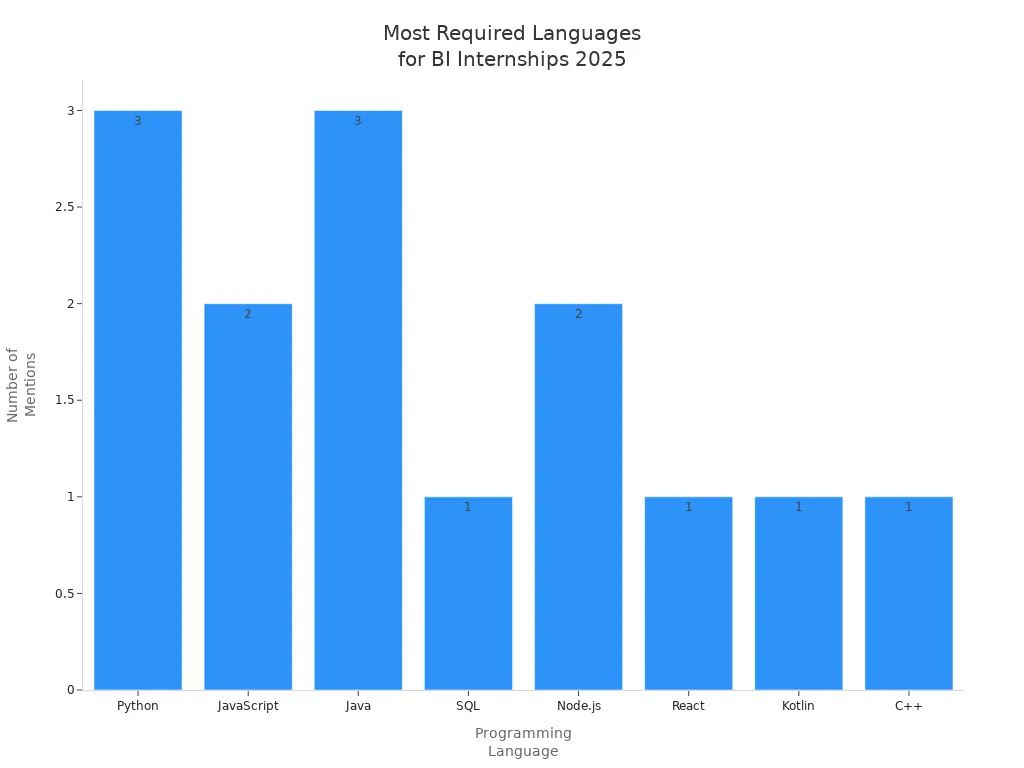
You should also get comfortable with business intelligence platforms. FineBI is a great example. FineBI lets you connect to many data sources, prepare and clean your data, and build dashboards with drag-and-drop tools. You don’t need to code to use FineBI, but if you know Python or SQL, you can do even more. FineBI helps you analyze trends, visualize data, and share insights with your team. Learning a tool like FineBI will make your application stand out and show employers you are ready to contribute from day one.
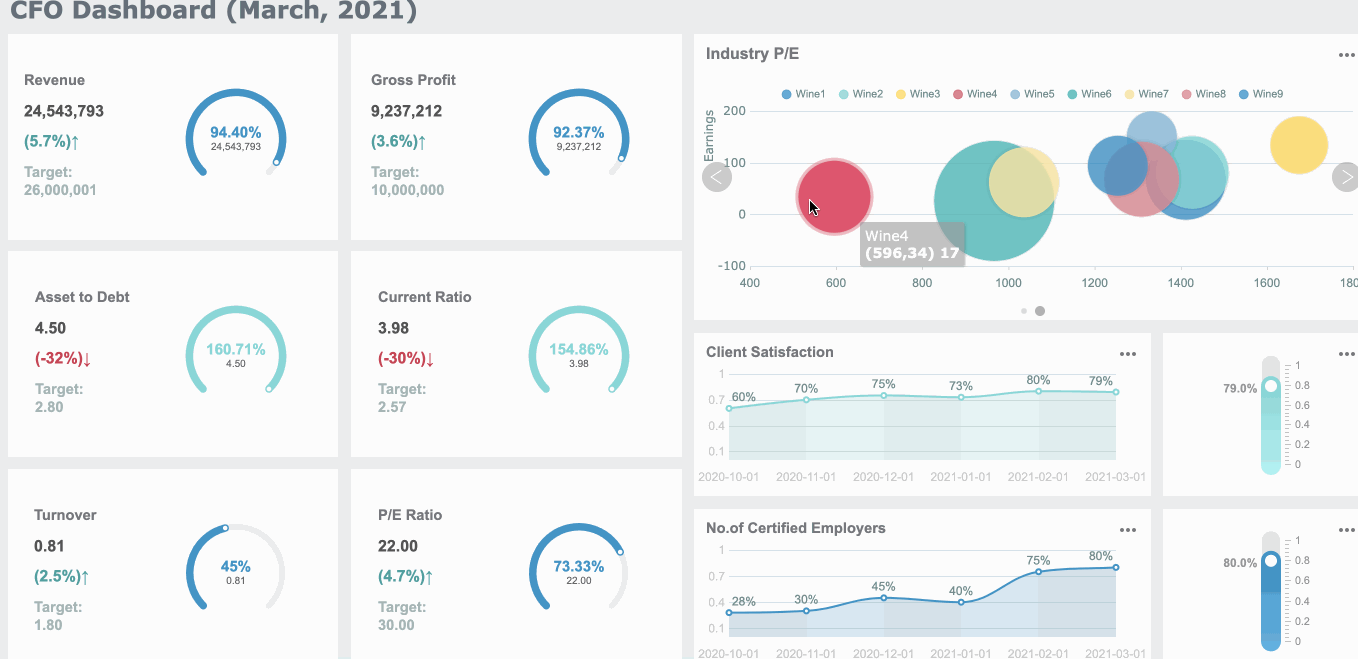

You want your business intelligence internship application to rise above the rest. Building a strong profile means more than just listing your skills. You need to show employers that you can solve real problems, work with data, and communicate your findings. Let’s break down how you can make your application shine.
Your resume is often the first thing recruiters see. You want it to grab their attention right away. Here are some strategies that hiring managers love:
Recruiters look for experience that proves you can use business intelligence skills in real situations. They want to see how you made an impact. Always mention the tools you used and tailor your resume for each job. This helps your most relevant experience stand out.
Tip: Keep your resume clear and focused. Use bullet points to make your achievements easy to read.
A strong portfolio can set you apart in the business intelligence internship race. Employers want to see what you can do, not just what you say you can do. The best portfolios include a mix of projects that show your range and depth.
| Project Type | Description |
|---|---|
| BI Case Study Portfolio | Highlight your skills in tools like Power BI, Tableau, or FineBI. |
| Diverse Range of Projects | Include 3 to 5 case studies covering data cleaning, modeling, and visualization. |
| Tailored Projects | Choose projects that fit your target industry, such as retail or healthcare analytics. |
| Compelling Case Studies | Each project should have a clear problem, your method, and the insights you found. |
| Showcase of Tools | List the tools you used for each project to show your technical skills. |
| Use of Visuals | Add charts, dashboards, and screenshots to illustrate your process and results. |
| Reflection on Learning | End each project with a short reflection on what you learned and how you improved. |
You don’t need dozens of projects. Focus on quality over quantity. Pick projects that show your ability to solve problems and communicate insights. If you have experience with FineBI, include a dashboard or case study built with it. This shows you can use modern BI tools and adapt to new technology.
Note: Employers love to see real-world impact. If your project helped a club, class, or small business, mention the results.
Certifications can boost your business intelligence internship profile. They show you are serious about learning and can handle industry tools. Here are some certifications that employers value:
You should also build your skills with BI platforms. FineBI is a great choice for students and beginners. It lets you connect to many data sources, clean and prepare data, and create dashboards—all with a simple drag-and-drop interface. You don’t need to code, but if you know Python or SQL, you can unlock even more features. FineBI helps you analyze trends, visualize results, and share insights with your team. Adding FineBI to your toolkit shows employers you are ready for the demands of a modern business intelligence internship.
Tip: Try building a sample dashboard in FineBI and include it in your portfolio. This gives you a real edge in interviews.
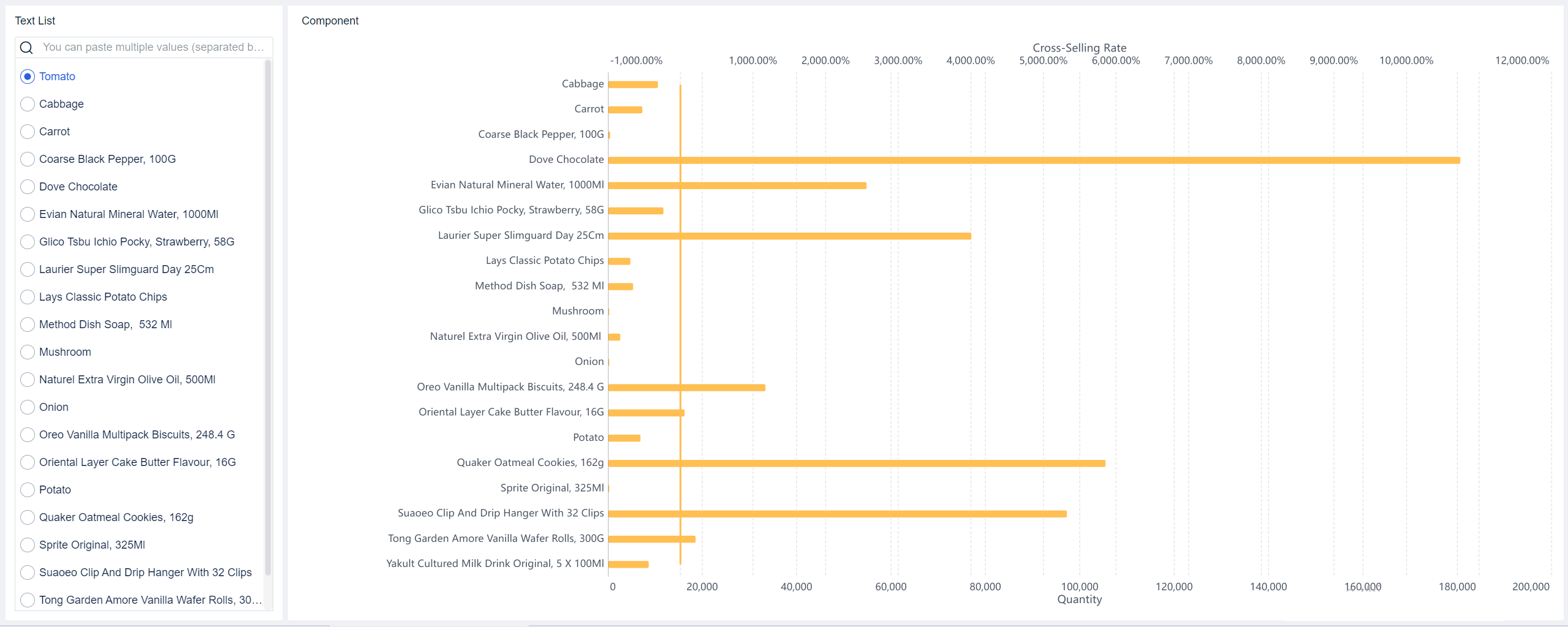
Looking for a business intelligence internship can feel like a big task, but you have more options than you think. You just need to know where to look and how to make the most of each opportunity. Let’s explore the best ways to find and apply for these roles.
You can start your search on job boards that focus on tech and business roles. These platforms list hundreds of internships every year. Here are some of the best places to find business intelligence internship openings:
Tip: Set up job alerts on these platforms. You’ll get notified as soon as new internships are posted.
Your university career center is one of your best allies. Career advisors can help you polish your resume, practice interviews, and connect you with employers. According to NACE, students who use their career centers are 2.2 times more likely to land a paid internship than those who do not. This means you can boost your chances just by asking for help. Many schools also run special programs, like career fairs and employer info sessions, that focus on business intelligence roles.
Networking can open doors that job boards cannot. Recent graduates say these strategies work best:
Note: Most internships are filled through connections. Don’t be shy about reaching out and following up.
If you want to stand out, try building a sample dashboard with FineBI and share it during your networking conversations. This shows you have hands-on skills and are ready to contribute from day one.

You want your application to stand out in a crowded field. Start by reading the job description for each business intelligence internship you apply for. Look for the skills and tools the company values most. Update your resume and portfolio to match those needs. Use the same keywords from the job post. This helps your application pass through automated systems and shows recruiters you pay attention to detail.
Showcase your best projects. If you have built dashboards or reports using tools like FineBI, include them. Employers love to see real examples of your work. Keep your resume clear and easy to read. Use bullet points to highlight your achievements and the impact you made.
A great cover letter can make a big difference. Address it to the right person if you can. Explain why you want this specific business intelligence internship and how your skills fit the role. Keep your letter short and focused. Avoid these common mistakes:
Share a story or example that shows your passion for business intelligence. Mention both your technical and soft skills. If you have experience with FineBI, talk about how you used it to solve a problem or create value.
Timing matters. Apply early when possible. Double-check your documents for errors before you hit submit. Save your files with clear names, like “FirstName_LastName_BI_Internship.pdf.” Follow the company’s instructions for submitting applications. Some companies want you to upload files, while others prefer email.
Track your applications in a simple spreadsheet. Note the company, position, date applied, and any follow-up steps. This helps you stay organized and respond quickly if a recruiter reaches out.
FineBI can give you an edge. If you include a FineBI dashboard in your portfolio or mention it in your cover letter, you show that you can handle real-world BI tools. This makes your application even stronger.
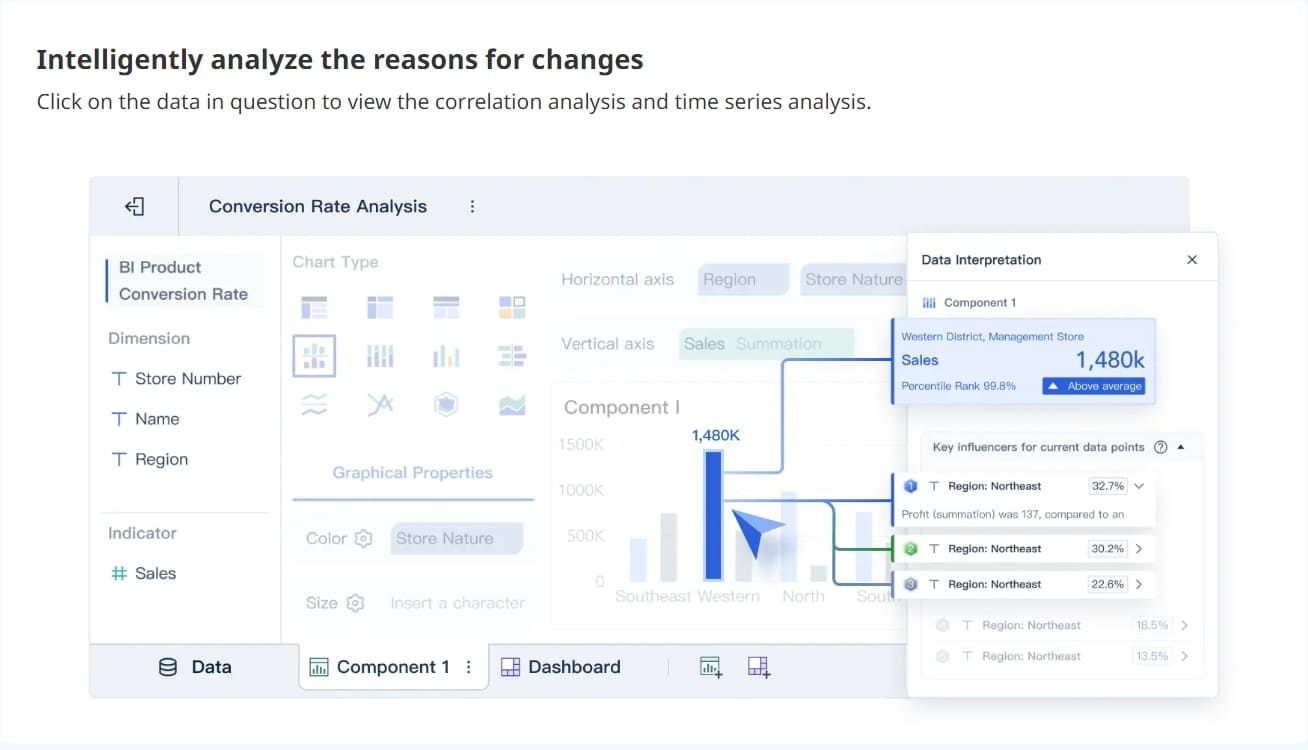

You’ve made it to the interview stage for your business intelligence internship. Now, you want to show employers you’re ready to take on real challenges. Let’s walk through the most common interview questions, technical assessments, and the soft skills you should highlight.
Interviewers want to see how you think and solve problems. You’ll face questions about business intelligence concepts, data handling, and visualization. Here’s a table with some of the most frequently asked questions for 2025:
| Question Number | Interview Question |
|---|---|
| 1 | What is OLAP? |
| 2 | What are Fact and Dimension tables? |
| 3 | Why is data normalization useful? |
| 4 | What are your favorite business intelligence tools? |
| 5 | What makes a good data visualization? |
| 6 | How many kinds of JOIN functions are there in SQL? |
| 7 | What is a pivot table? |
Practice your answers out loud. Use examples from your coursework or portfolio. If you’ve built dashboards or reports, talk about your process and the results you achieved.
Many interviews include a technical assessment. You might need to clean data, create a dashboard, or explain your approach to a real-world problem. If you know FineBI, you have an advantage. FineBI lets you connect to different data sources, prepare and process data, and build interactive dashboards with drag-and-drop tools. You can show how you use filters, join tables, and visualize trends. Employers want to see that you can turn raw data into insights quickly and clearly. Bring a sample dashboard to your interview or be ready to walk through your process step by step.
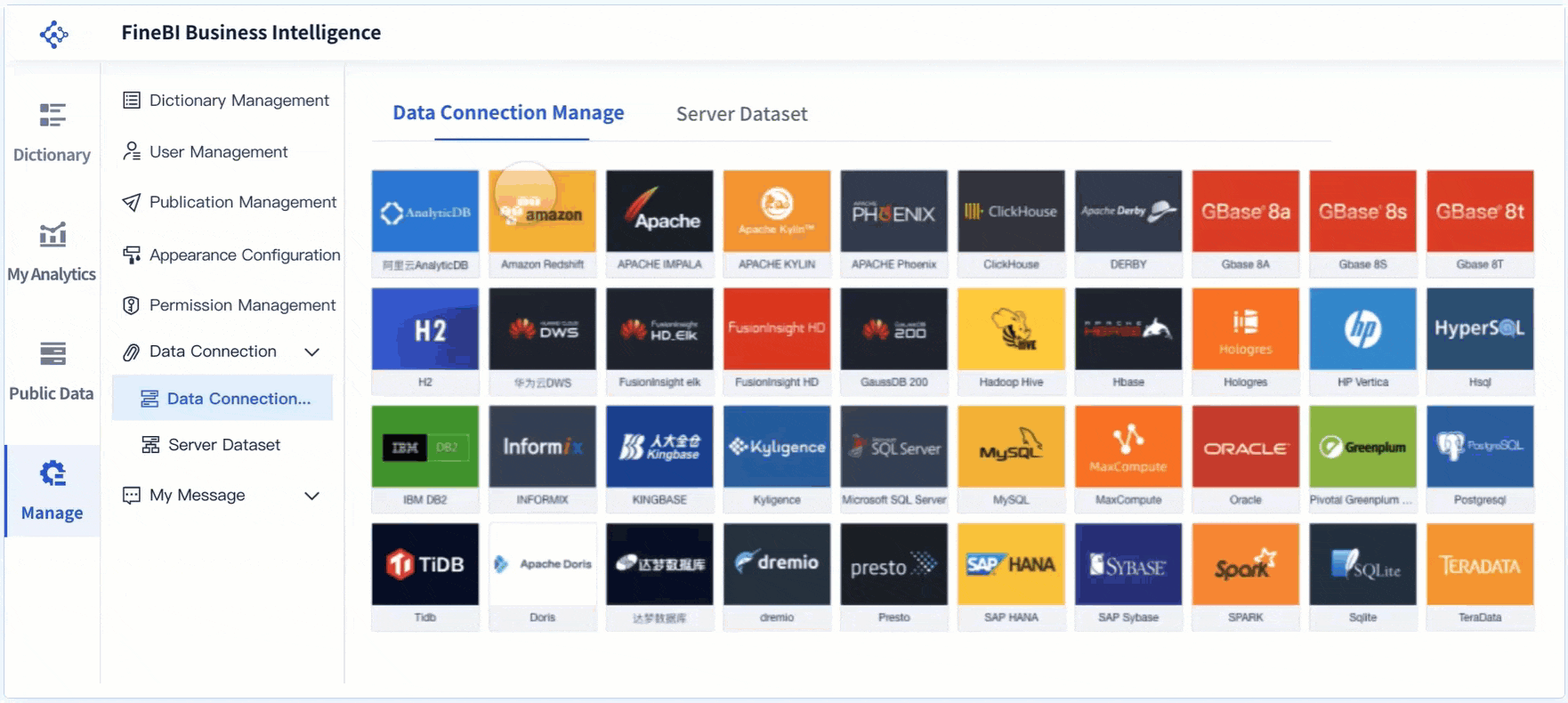
Technical skills matter, but soft skills set you apart. Employers look for teamwork, communication, and organization. Here’s a table showing which soft skills are in high demand:
| Soft Skill | Demand Level |
|---|---|
| Teamwork | High |
| Business Communication Skills | High |
| Organization Skills | High |
| Communication Skills | Medium |
| Critical Thinking Skills | Medium |
| Learning and Information Handling Skills | Medium |
| Leadership Skills | Medium |
| Negotiation Skills | Low |
| Public Speaking Skills | Low |
| Emotional Management | Low |
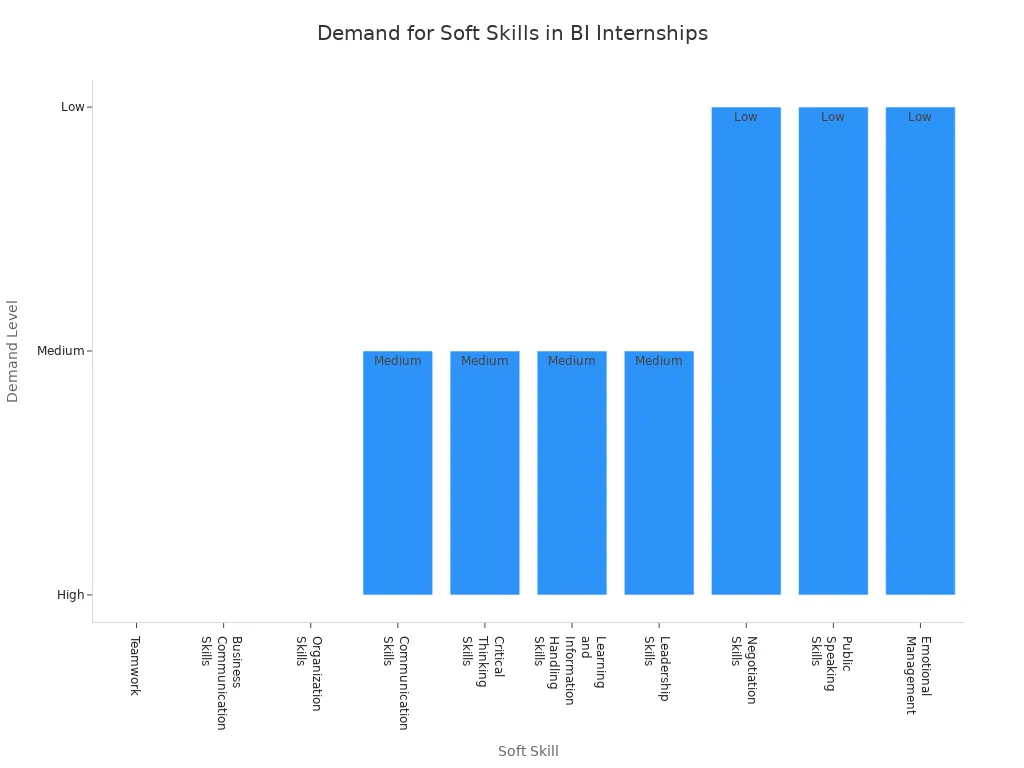
You should talk about how you work with others, organize your tasks, and communicate your findings. Mention times when you solved problems as part of a team or explained complex ideas in simple terms. Employers want to know you can handle feedback, learn quickly, and stay organized under pressure.
Tip: Prepare a story that shows your teamwork or communication skills. This helps interviewers see how you’ll fit into their team.
You finished your business intelligence internship interview. Now, you want to leave a great impression. The way you follow up can set you apart from other candidates. Career experts suggest a few simple steps:
If you do not hear back after a week, send a second follow-up email. Thank the interviewer again and let them know you are still interested in the position. Staying polite and persistent helps you stand out.
Tip: A thoughtful follow-up can show your professionalism and help you build a positive relationship with the company.
You received an offer—congratulations! Before you accept, take a moment to review the details. Many students feel nervous about negotiating, but you can do it with the right approach. Here are some strategies that work well:
For example, Olivia, a computer science student, researched salary ranges and shared her skills during her negotiation. She showed her excitement for the job and used her research to ask for a higher hourly rate and extra benefits. Her approach worked because she stayed positive and prepared.
If you want to impress your future employer even more, mention your experience with FineBI. This tool helps you analyze data, build dashboards, and share insights—skills that every business intelligence team values.
You’ve got everything you need to land a business intelligence internship. Start by building your skills and creating a strong profile. Learn BI tools like FineBI and use top resources to find opportunities. Prepare for interviews and stay persistent. Take action now and keep improving. When you prepare and use a smart strategy, you make the process much easier.
MicroStrategy Business Intelligence Essentials for Today’s Enterprises
Top Emerging Business Intelligence Trends Shaping 2025
What Does a Business Intelligence Engineer Do in 2025
Top Business Intelligence Services Providers to Watch in 2025
What Are the Top Predictive Analytics Tools for 2025?
What Are the Top Digital Marketing Analytics Tools for 2025?
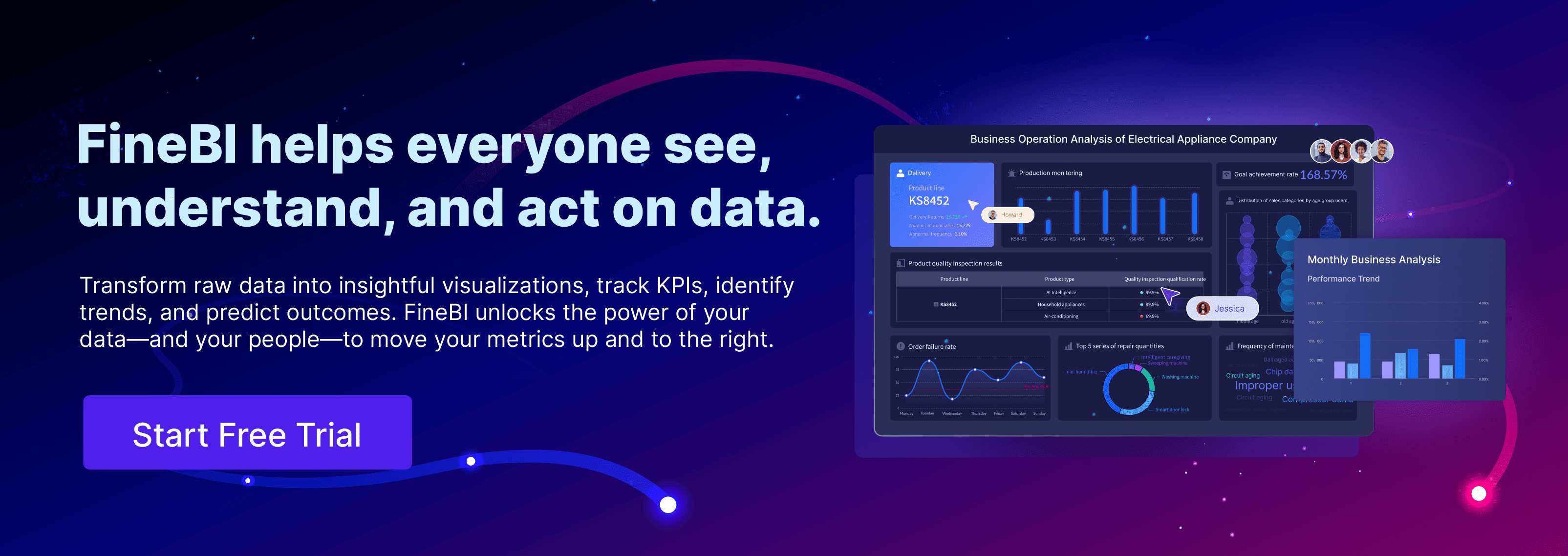

The Author
Lewis
Senior Data Analyst at FanRuan
Related Articles
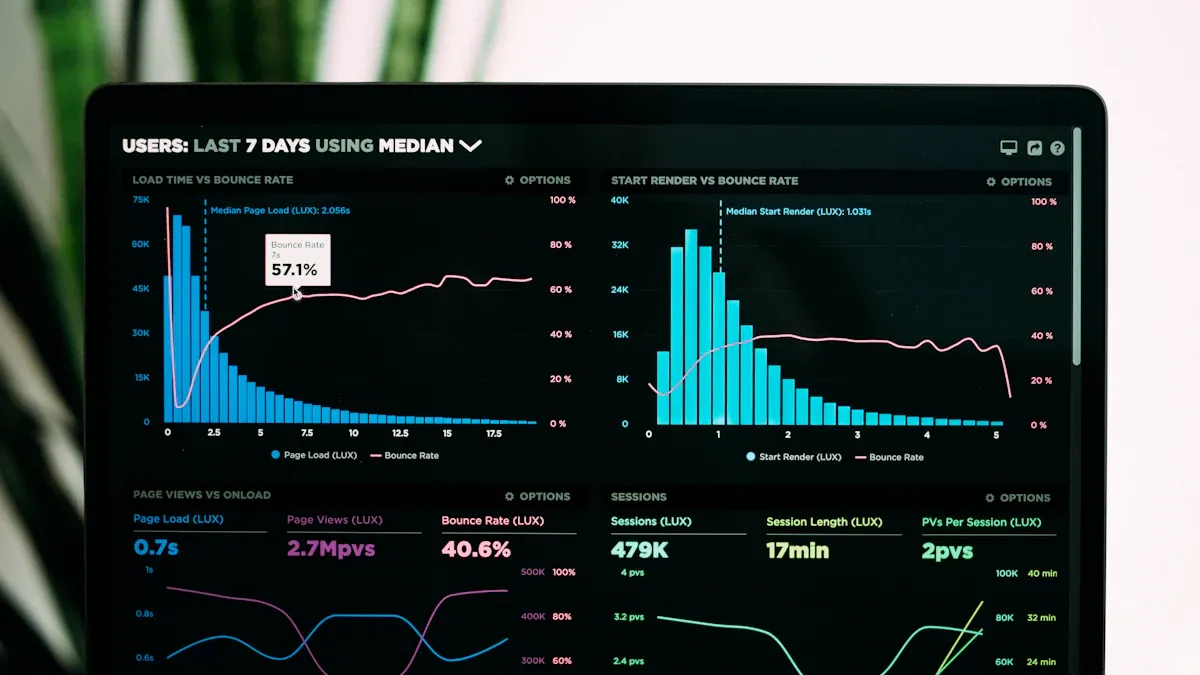
What is a Business Intelligence System and How Does It Work
A business intelligence system collects, analyzes, and visualizes data, turning raw information into actionable insights for smarter business decisions.
Lewis
Jan 04, 2026

Top 3 Retail Management Software Picks
Compare the top 3 retail management software. See features, pricing, and which solution fits your business needs for inventory and sales.
Lewis
Dec 30, 2025

What Are Enterprise BI Solutions and How Do They Work
Enterprise BI solutions unify business data, enabling real-time analytics, secure collaboration, and smarter decision-making across your organization.
Lewis
Dec 22, 2025